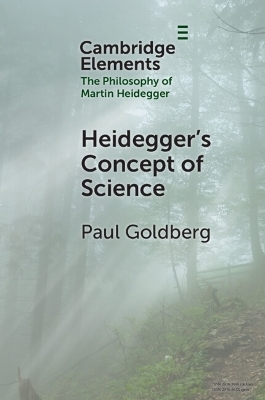
Heidegger's Concept of Science
Seiten
2024
Cambridge University Press (Verlag)
978-1-009-52353-0 (ISBN)
Cambridge University Press (Verlag)
978-1-009-52353-0 (ISBN)
- Lieferbar (Termin unbekannt)
- Versandkostenfrei innerhalb Deutschlands
- Auch auf Rechnung
- Verfügbarkeit in der Filiale vor Ort prüfen
- Artikel merken
This Element argues that Heidegger's concept of science has two core features. Heidegger critiques a security-oriented concept of science, meanwhile advancing an access-oriented concept of science.
This Element argues that Heidegger's concept of science has two core features. Heidegger critiques a security-oriented concept of science, which he associates with the dominance of physics in modern science and metaphysics and with a progressive resistance among philosophers and scientists to ontological questioning. Meanwhile, Heidegger advances an access-oriented concept of science, on which science is essentially founded on ontological disclosures but also constantly open to the possibility of new revolutionary disclosures. This Element discusses how these commitments develop in Heidegger's early and later thinking, and argues that they inform his views on the history of Western metaphysics and on the possibilities for human flourishing that modernity, and modern science specifically, affords. The Element also discusses Heidegger's dialogue with Werner Heisenberg about quantum physics; and throughout, it highlights points of contact and divergence between Heidegger and other philosophers of science such as Karl Popper, Thomas Kuhn, Paul Feyerabend, and Helen Longino.
This Element argues that Heidegger's concept of science has two core features. Heidegger critiques a security-oriented concept of science, which he associates with the dominance of physics in modern science and metaphysics and with a progressive resistance among philosophers and scientists to ontological questioning. Meanwhile, Heidegger advances an access-oriented concept of science, on which science is essentially founded on ontological disclosures but also constantly open to the possibility of new revolutionary disclosures. This Element discusses how these commitments develop in Heidegger's early and later thinking, and argues that they inform his views on the history of Western metaphysics and on the possibilities for human flourishing that modernity, and modern science specifically, affords. The Element also discusses Heidegger's dialogue with Werner Heisenberg about quantum physics; and throughout, it highlights points of contact and divergence between Heidegger and other philosophers of science such as Karl Popper, Thomas Kuhn, Paul Feyerabend, and Helen Longino.
Texts and Method of Citation; 1. Introduction: Heidegger's Concept of Science; 2. Key Concepts for the Early Heidegger's Approach to Science; 3. Heidegger's Critique of Physicalism in Being and Time; 4. The Early Heidegger on Science, Truth, and Authenticity; 5. Continuity and Development in the Later Heidegger's Approach to Science; 6. Heidegger and Heisenberg on Quantum Physics, Science, Technology, and Modernity; 7. Coda: Open Questions.
| Erscheinungsdatum | 03.12.2024 |
|---|---|
| Reihe/Serie | Elements in the Philosophy of Martin Heidegger |
| Zusatzinfo | Worked examples or Exercises |
| Verlagsort | Cambridge |
| Sprache | englisch |
| Themenwelt | Geisteswissenschaften ► Philosophie |
| Sozialwissenschaften | |
| ISBN-10 | 1-009-52353-8 / 1009523538 |
| ISBN-13 | 978-1-009-52353-0 / 9781009523530 |
| Zustand | Neuware |
| Informationen gemäß Produktsicherheitsverordnung (GPSR) | |
| Haben Sie eine Frage zum Produkt? |
Mehr entdecken
aus dem Bereich
aus dem Bereich
wie Philosophie uns helfen kann, unseren Weg zu finden
Buch | Hardcover (2023)
dtv Verlagsgesellschaft
26,00 €


